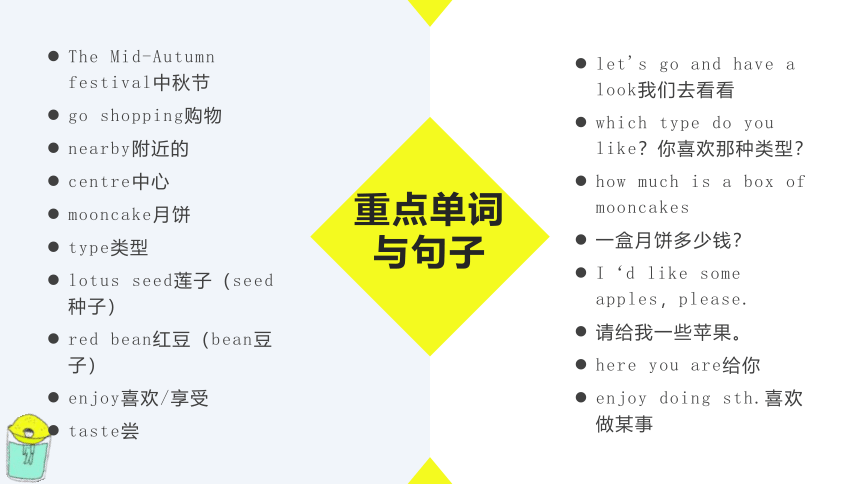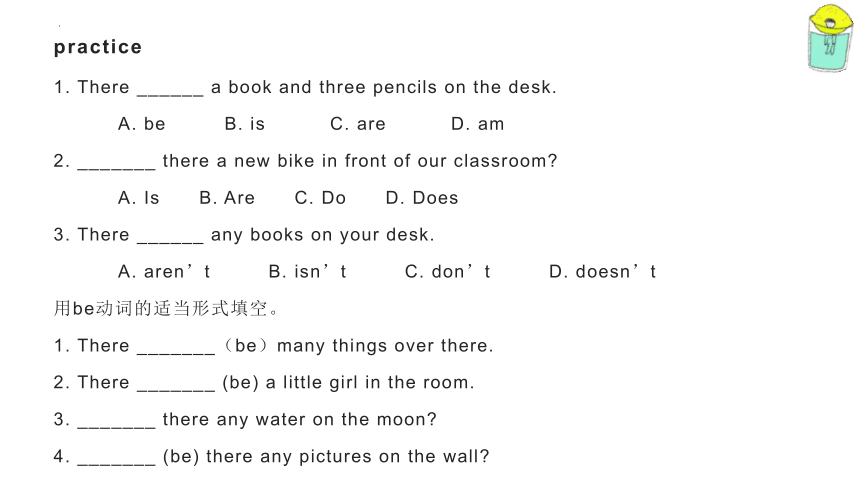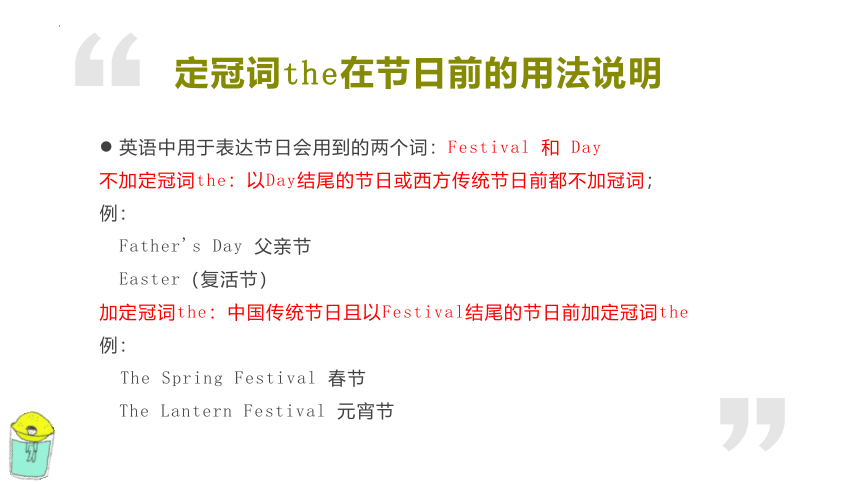Unit 4 the mid-Autumn festive is coming课件(共12张ppt)
文档属性
| 名称 | Unit 4 the mid-Autumn festive is coming课件(共12张ppt) |

|
|
| 格式 | zip | ||
| 文件大小 | 341.4KB | ||
| 资源类型 | 教案 | ||
| 版本资源 | 湘少版 | ||
| 科目 | 英语 | ||
| 更新时间 | 2022-10-13 23:13:47 | ||
图片预览






文档简介
(共12张PPT)
六年级英语
unit 4 the mid-Autumn festive is coming
复习上三个单元的单词
after school
begin after
summer holiday talk about
English storybook during
learn writing play games
learn words and sentences
practise often sometimes early before always
wave usually return
weekday do her homework
be late for school
wave goodbye
read a newspaper take a walk
play chess search send
greet world Email
search for a lot of things
find out about countries
play computer games
send greeting
Email my friends
重点单词与句子
The Mid-Autumn festival中秋节
go shopping购物
nearby附近的
centre中心
mooncake月饼
type类型
lotus seed莲子(seed种子)
red bean红豆(bean豆子)
enjoy喜欢/享受
taste尝
let's go and have a look我们去看看
which type do you like?你喜欢那种类型?
how much is a box of mooncakes
一盒月饼多少钱?
I‘d like some apples,please.
请给我一些苹果。
here you are给你
enjoy doing sth.喜欢做某事
语法知识
there be 句型基本认识
定义:There be句型表示某处存在某物或某人。
结构:
There is +单数可数名词/不可数名词+ 地点状语.
There are +复数名词+地点状语.
注意事项: there是引导词,在句中不充当任何成分,翻译时也不必译出。句子的主语是某人或某物,谓语动词be要与主语(某人或某物)的数保持一致。当主语是两个或两个以上的名词时,谓语动词要与跟它最近的那个名词一致。如:
There is a bird in the tree. 树上有一只鸟。
There is a teacher and many students in ourclassroom. 我们教室里有一位老师和许多学生。
There are two boysand a girl under the tree. 树下有两个男孩,一个女孩。
practice
1. There ______ a book and three pencils on the desk.
A. be B. is C. are D. am
2. _______ there a new bike in front of our classroom
A. Is B. Are C. Do D. Does
3. There ______ any books on your desk.
A. aren’t B. isn’t C. don’t D. doesn’t
用be动词的适当形式填空。
1. There _______(be)many things over there.
2. There _______ (be) a little girl in the room.
3. _______ there any water on the moon
4. _______ (be) there any pictures on the wall
定冠词the在节日前的用法说明
英语中用于表达节日会用到的两个词:Festival 和 Day
不加定冠词the:以Day结尾的节日或西方传统节日前都不加冠词;
例:
Father's Day 父亲节
Easter(复活节)
加定冠词the:中国传统节日且以Festival结尾的节日前加定冠词the
例:
The Spring Festival 春节
The Lantern Festival 元宵节
中国传统节日且以Festival结尾的节日前加定冠词the,如:
The Spring Festival 春节
The Lantern Festival 元宵节
The Dragon Boat Festival 端午节
The Mid-autumn Festival 中秋节
The Double Ninth Festival 重阳节
以Day结尾的节日或西方传统节日前都不加冠词,如:
Children's Day 儿童节
National Day 国庆节
Christmas day 圣诞节
April Fools' Day 愚人节
Thanksgiving Day 感恩节
Valentine's Day 情人节
International Workers' Day/May Day 劳动节
Arbor Day 植树节
Army Day 建军节
Teacher's Day 教师节
All Saints' Day/All Hallows' Day 万圣节
Tomb-Sweeping Day 清明节
询问价格
句型1 How much is +可数名词单数/不可数名词
答语: It's + 价格。
条件: 当询问的物品是一个,并且是可数名词时或者当询问的物品是不可数名词时。
eg:– How much is a schoolbag 一个书包多少钱。
–It's twenty–two yuan.25元。
句型2 How much are +可数名词的复数?
答语: They are+价格。
条件: 当询问的物品为两个或者两个以上时
eg:–How much are three apples 三个苹果多少钱?
–They are five yuan. 5元。
in at on的地点介词用法
at主要用于:
at通常指小地方,如:home,school
at通常所指范围不太明显,表示“在……附近,旁边”
Mrs. Jones is at home Thursdays.琼斯太太每星期四在家接待客人
The ball is at the corner.球搁在角落里
in主要用于:
in通常指大地方,如:London,Beijing
在内部;还可以表示“在…范围之内”(是从属关系)
I live in a great city big city and my sister lives at a small town 我住在大城市,我姐姐住在一个小城镇
The ball is in the box. 球在盒子里
in at on的地点介词用法
on主要用于:
on主要指“在……之上”,强调和表面接触,如on the ground
表示毗邻,接壤(是相邻关系)
He put his watch on the desk 他把手表放在桌子上
Canada lies on the north of America 加拿大在美国的北边(与美国接壤)
practice
使用介词in at on填空
There is some tea the cup.
There are some apples the table.
He arrived China yesterday.
We arrived our middle school.
What’s the box
There’s a wallet lying the ground.
He works a farm.
He lives Shanghai.
Let’s meet the station.
I like 和I'd like 有什么区别
I like 和I'd like ,二者在意思上的区别不是很大
i like表示我喜欢,语气很肯定,目的性很明确。
i would like表示我想要如何如何,语气较委婉,缓和。
外国人谈话一般较客气,在征询意见或表示要求时都用i would like
i like相比之下就坚决表示个人喜好,语气较直接。
六年级英语
unit 4 the mid-Autumn festive is coming
复习上三个单元的单词
after school
begin after
summer holiday talk about
English storybook during
learn writing play games
learn words and sentences
practise often sometimes early before always
wave usually return
weekday do her homework
be late for school
wave goodbye
read a newspaper take a walk
play chess search send
greet world Email
search for a lot of things
find out about countries
play computer games
send greeting
Email my friends
重点单词与句子
The Mid-Autumn festival中秋节
go shopping购物
nearby附近的
centre中心
mooncake月饼
type类型
lotus seed莲子(seed种子)
red bean红豆(bean豆子)
enjoy喜欢/享受
taste尝
let's go and have a look我们去看看
which type do you like?你喜欢那种类型?
how much is a box of mooncakes
一盒月饼多少钱?
I‘d like some apples,please.
请给我一些苹果。
here you are给你
enjoy doing sth.喜欢做某事
语法知识
there be 句型基本认识
定义:There be句型表示某处存在某物或某人。
结构:
There is +单数可数名词/不可数名词+ 地点状语.
There are +复数名词+地点状语.
注意事项: there是引导词,在句中不充当任何成分,翻译时也不必译出。句子的主语是某人或某物,谓语动词be要与主语(某人或某物)的数保持一致。当主语是两个或两个以上的名词时,谓语动词要与跟它最近的那个名词一致。如:
There is a bird in the tree. 树上有一只鸟。
There is a teacher and many students in ourclassroom. 我们教室里有一位老师和许多学生。
There are two boysand a girl under the tree. 树下有两个男孩,一个女孩。
practice
1. There ______ a book and three pencils on the desk.
A. be B. is C. are D. am
2. _______ there a new bike in front of our classroom
A. Is B. Are C. Do D. Does
3. There ______ any books on your desk.
A. aren’t B. isn’t C. don’t D. doesn’t
用be动词的适当形式填空。
1. There _______(be)many things over there.
2. There _______ (be) a little girl in the room.
3. _______ there any water on the moon
4. _______ (be) there any pictures on the wall
定冠词the在节日前的用法说明
英语中用于表达节日会用到的两个词:Festival 和 Day
不加定冠词the:以Day结尾的节日或西方传统节日前都不加冠词;
例:
Father's Day 父亲节
Easter(复活节)
加定冠词the:中国传统节日且以Festival结尾的节日前加定冠词the
例:
The Spring Festival 春节
The Lantern Festival 元宵节
中国传统节日且以Festival结尾的节日前加定冠词the,如:
The Spring Festival 春节
The Lantern Festival 元宵节
The Dragon Boat Festival 端午节
The Mid-autumn Festival 中秋节
The Double Ninth Festival 重阳节
以Day结尾的节日或西方传统节日前都不加冠词,如:
Children's Day 儿童节
National Day 国庆节
Christmas day 圣诞节
April Fools' Day 愚人节
Thanksgiving Day 感恩节
Valentine's Day 情人节
International Workers' Day/May Day 劳动节
Arbor Day 植树节
Army Day 建军节
Teacher's Day 教师节
All Saints' Day/All Hallows' Day 万圣节
Tomb-Sweeping Day 清明节
询问价格
句型1 How much is +可数名词单数/不可数名词
答语: It's + 价格。
条件: 当询问的物品是一个,并且是可数名词时或者当询问的物品是不可数名词时。
eg:– How much is a schoolbag 一个书包多少钱。
–It's twenty–two yuan.25元。
句型2 How much are +可数名词的复数?
答语: They are+价格。
条件: 当询问的物品为两个或者两个以上时
eg:–How much are three apples 三个苹果多少钱?
–They are five yuan. 5元。
in at on的地点介词用法
at主要用于:
at通常指小地方,如:home,school
at通常所指范围不太明显,表示“在……附近,旁边”
Mrs. Jones is at home Thursdays.琼斯太太每星期四在家接待客人
The ball is at the corner.球搁在角落里
in主要用于:
in通常指大地方,如:London,Beijing
在内部;还可以表示“在…范围之内”(是从属关系)
I live in a great city big city and my sister lives at a small town 我住在大城市,我姐姐住在一个小城镇
The ball is in the box. 球在盒子里
in at on的地点介词用法
on主要用于:
on主要指“在……之上”,强调和表面接触,如on the ground
表示毗邻,接壤(是相邻关系)
He put his watch on the desk 他把手表放在桌子上
Canada lies on the north of America 加拿大在美国的北边(与美国接壤)
practice
使用介词in at on填空
There is some tea the cup.
There are some apples the table.
He arrived China yesterday.
We arrived our middle school.
What’s the box
There’s a wallet lying the ground.
He works a farm.
He lives Shanghai.
Let’s meet the station.
I like 和I'd like 有什么区别
I like 和I'd like ,二者在意思上的区别不是很大
i like表示我喜欢,语气很肯定,目的性很明确。
i would like表示我想要如何如何,语气较委婉,缓和。
外国人谈话一般较客气,在征询意见或表示要求时都用i would like
i like相比之下就坚决表示个人喜好,语气较直接。
同课章节目录
- Unit 1 What did you do during the holidays?
- Unit 2 Katie always gets up early.
- Unit 3 I like my compute
- Unit 4 The Mid-Autumn Festival is coming...
- Unit 5 It will be sunny and cool tomorrow
- Unit 6 I will bring a big bottle of orange juice
- Unit 7 What can I do?
- Unit 8 We shouldn't waste wate
- Unit 9 This bird is bigger than fist one...
- Unit 10 I don't feel well today
- Unit 11 Shall we go to the theatre?
- Unit12 It's Christmas again!
